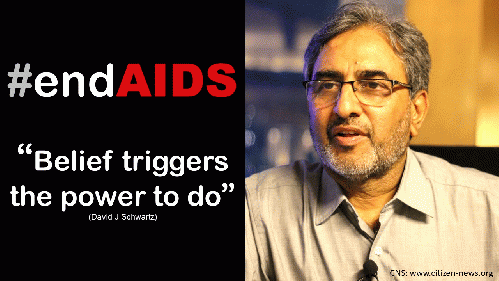
Dr Ishwar Gilada, National President of AIDS Society of India (ASI)
(Image by CNS (Citizen News Service)) Details DMCA
Listen or download the audio podcast: http://bit.ly/2gLgw54
(CNS): Mahatma Gandhi had once said, "If I have the belief that I can do it, I shall surely acquire the capacity to do it even if I may not have it at the beginning." Gandhi's thought resurfaced after listening to Dr Ishwar Gilada, President of AIDS Society of India (ASI). He could not have been more sincere in demanding action to the fullest to #endAIDS by 2030 as promised by our governments.
Fragmented actions in silos and scattered across sectors are just not enough to build up the pace on the ground to help governments keep this promise to #endAIDS. At the 2015 UN General Assembly, our governments had committed to end AIDS, TB and malaria by 2030 as part of the Sustainable Development Goals (SDGs).
Dr Ishwar Gilada spoke with CNS (Citizen News Service) at the sidelines of the 9th National Conference of AIDS Society of India (ASICON 2016). This interview is part of CNS Inspire series -- featuring people who have had decades of experience in health and development, and learning from them what went well and not-so-well and how these learnings can shape the responses for sustainable development over the next decade.
Dr Gilada is also the Secretary of People's Health Organisation, and is among the very few doctors who had come forward to care for people living with HIV (PLHIV) in India when the first case was diagnosed. He is credited with several firsts for PLHIV in India - India's first AIDS clinic, first mobile AIDS clinic, first HIV hotline, first prevention of mother-to-child transmission of HIV programme, among others. He was the Chair of ASICON 2016 and Co-Chair of the 18th National Conference on Pulmonary Diseases (NAPCON) 2016. He was in conversation with CNS Managing Editor Shobha Shukla.
"First they ignore you..."
True to the ageless adage "First they ignore you, then they laugh at you, then they fight you, then you win", when the first HIV case got diagnosed in India there were attempts at all levels to deny the truth and fight it. When Dr Gilada raised the AIDS alarm in India more than thirty years back, even doctors opposed him vehemently. Arguments using the garb of 'culture', 'tradition', 'morality', 'HIV is a western problem', and blatant denial of anything related to sex and sexuality hounded those initial leaders who had recognized the brewing epidemic of HIV, which India was so unprepared to uncover.
As data emerged, science progressed and bold community voices raised alarm, the government had to acknowledge that AIDS had indeed arrived in India. That led to the emergence of National AIDS Control Programme in early 1990s. Dr Gilada had already predicted this, based on his experience of working as a medical professional, and seeing how the sexually transmitted infections (STIs) were growing in the red-light areas of Mumbai. His clinical experience and data on transmission of STIs reflected that infections were getting transmitted from sex workers to the community -- conduits being the clients who were bringing these infections to their homes. Let's not forget that HIV is an STI too (unless gets transmitted via non-sexual routes such as blood transfusion).
(Note: You can view every article as one long page if you sign up as an Advocate Member, or higher).





